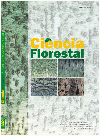
|
Ciência Florestal
Centro de Pesquisas Florestais - CEPEF, Departamento de Ciências Florestais - DCFL, Programa de Pós Graduação em Engenharia Florestal - PPGEF
ISSN: 0103-9954
EISSN: 0103-9954
Vol. 28, No. 3, 2018, pp. 1049-1059
|
 Bioline Code: cf18096
Bioline Code: cf18096
Full paper language: Portuguese
Document type: Research Article
Document available free of charge
|
|
|
Ciência Florestal, Vol. 28, No. 3, 2018, pp. 1049-1059
| pt |
ESTOQUE E DINÂMICA DE BIOMASSA ARBÓREA EM FLORESTA OMBRÓFILA DENSA NA FLONA TAPAJÓS: AMAZÔNIA ORIENTAL
Santos, Fabio Guerra; Camargo, Plinio Barbosa de & Oliveira Junior, Raimundo Cosme de
Resumo
A análise das oscilações dos estoques de biomassa em florestas tropicais permite descrever o comportamento
desses ecossistemas diante de alterações naturais ou antropogênicas. O objetivo deste trabalho foi avaliar
o estoque e a dinâmica de biomassa no período (2007-2010) em Floresta Ombrófila Densa de duas áreas
de pesquisa na FLONA - Tapajós: Amazônia oriental, denominadas Área 1 e Área 2, distantes
aproximadamente 45 km uma da outra. A biomassa foi estimada através de equação alométrica e medidas
de DAP, proveniente de 12 parcelas permanentes, sendo 6 em cada área. Os resultados mostraram que
houve diferença significativa no estoque médio anual de biomassa entre a Área 1 (293,19 ± 27,74; 298,21
± 31,73; 299,60 ± 29,46; 298,11 ± 29,40 Mg.ha-1) e a Área 2 (254,35 ± 69,61; 259,10 ± 70,05; 261,00 ±
69,43; 248,92 ± 61,78 Mg.ha-1). Notou-se variação anual no estoque de biomassa em intervalos de medições
superiores a um ano, devido às oscilações na taxa de mortalidade, recrutamento e incremento, além da
área basal e abundância dos indivíduos em cada área. A maior concentração de indivíduos ocorreu nas
classes diamétricas 10 ≤ DAP ≤ 30 cm, porém, verificou-se que os indivíduos com DAP ≥ 60 cm em
concentração menor estocam biomassa equivalente à da classe diamétrica 10 ≤ DAP ≤ 30 cm. Concluiu-se
que as oscilações na taxa de mortalidade, recrutamento e incremento, além da abundância e área basal
nestes locais afetaram os estoques de biomassa.
Palavras-chave
método indireto; distribuição diamétrica; abundância
|
| |
| en |
STOCKS AND DYNAMICS OF TREE BIOMASS IN TROPICAL RAIN FOREST IN THE TAPAJOS NATIONAL FOREST, EASTERN AMAZONIA
Santos, Fabio Guerra; Camargo, Plinio Barbosa de & Oliveira Junior, Raimundo Cosme de
Abstract
The analysis of the oscillations of biomass stocks in tropical forests allows us to describe the behavior
of these ecosystems in the face of natural or anthropogenic changes. The objective of this study was to
evaluate the inventory and dynamics of biomass in the period (2007-2010) in dense rain forest in two areas
of research in the National Forest – Tapajos, eastern Amazonia, called Area 1 and Area 2, 45 km distant from
each other. The biomass was estimated using allometric equation and DAP, from 12 permanent plots, with
six in each area. The results showed a significant difference in annual average stock biomass between Area
1 (293.19 ± 27.74, 298.21 ± 31.73, 299.60 ± 29.46, 298.11 ± 29.40 Mg. ha-1) and Area 2 (254.35 ± 69.61,
259.10 ± 70.05, 261.00 ± 69.43, 248.92 ± 61.78 Mg.ha-1). Besides that, it was noted annual change in stock
biomass measurements at intervals of greater than one year due to fluctuations in mortality, recruitment
and growth, besides the basal area and abundance of individuals in each area. The highest concentration of
individuals occurred in diametric classes DAP 10 ≤ DAP ≤ 30 cm, however, it was verified that individuals
with DAP ≥ 60 cm in lower concentration stored biomass equivalent to diametric classes 10 ≤ DAP ≤ 30
cm. We conclude that fluctuations in mortality, recruitment and growth, and abundance and basal area of
these sites affected the stock biomass.
Keywords
indirect method; diameter distribution; abundance
|
| |
© Copyright 2018 - Ciência Florestal
Alternative site location: http://cascavel.ufsm.br/revistas/ojs-2.2.2/index.php/cienciaflorestal/index
|
|
